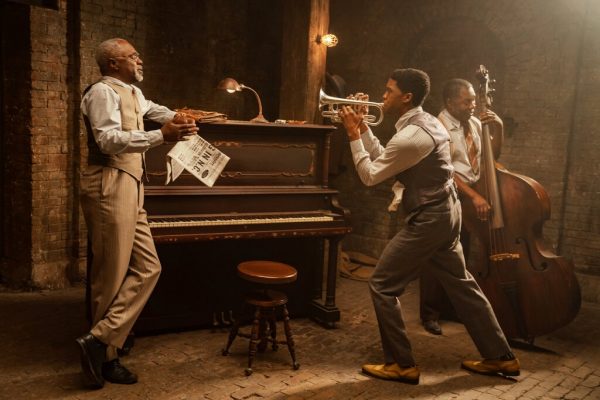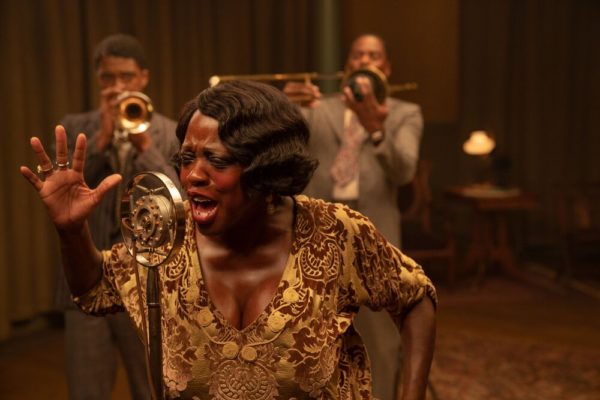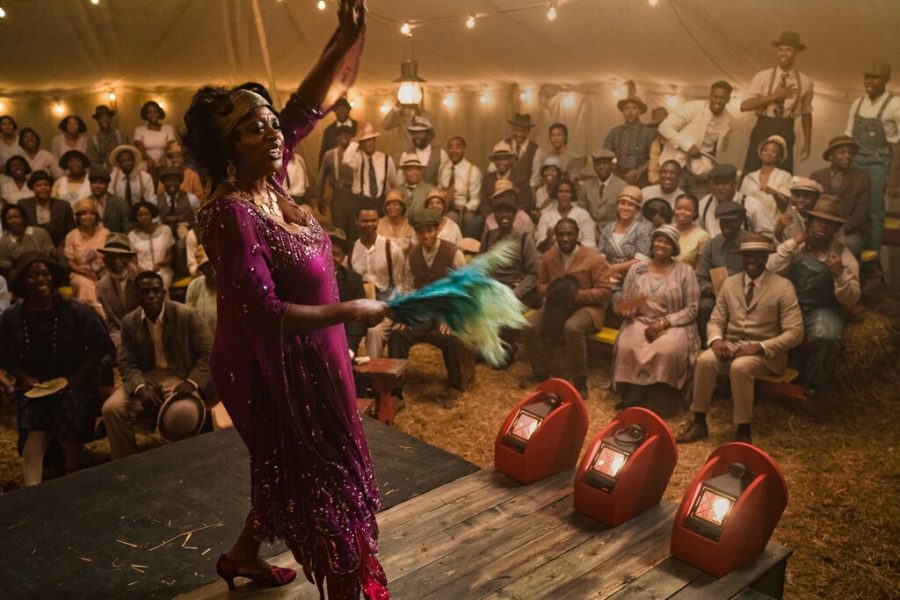When Ma Rainey’s Black Bottom released on Netflix in December 2020, it generated a lot of buzz. After all, it was Black Panther actor Chadwick Boseman’s last film after he died following a silent battle with cancer in August 2020. The film was soon nominated in the Best Actor, Best Actress, Production Design, Makeup, and Costume Design categories at the 93rd Academy Awards. Boseman even won the Golden Globe Award and Screen Actors Guild Award for Best Actor posthumously.
Directed by George C Wolfe, the film is an adaptation of popular African-American playwright August Wilson’s 1982 play of the same name. Written as part of his 10-play series titled Pittsburgh Cycle, this play chronicles the tumultuous journey of legendary blues singer Ma Rainey and her band during a recording session in Chicago in the 1920s.
The film is largely faithful to the play with a few changes to bring out the play’s themes of Black exploitation, racism and interpersonal conflicts better. With captivating and convincing performances by the ensemble cast, the movie manages to make its point: the existing white power structures stripping them off their power in the guise of helping them.
The context
The story takes place over an afternoon at a recording studio in Chicago when the band, having arrived earlier than Ma (Viola Davis), begins to discuss racism, music, God, and their life experiences.

Boseman plays Levee, a hot-headed and ambitious trumpet player who dreams of having his own band someday. He gives his original compositions to Ma’s apathetic white producer Mel Sturdyvant (Johnny Coyn), in the hope of recording his own creations. Leeve, along with Cutler (Colman Domingo), Toledo (Gylnn Turman) and Slow Drag (Michael Potts) form Ma Rainey’s band. Faithful to Ma, the rest of the band tries their best to discourage Levee from rubbing her the wrong way.
Ma and the rest of the band, especially Toledo, do not get along with Levee, whom they find arrogant and wayward. Director Wolfe shows how they frequently lock horns with Levee over his flippant attitude and inability to take his role in the band seriously. Ma is also wary of his interest in her girlfriend Dussie Mae.
While the band has their own conflicts, the way Ma’s manager, Irvin (Jeremy Shamos) uses and tries to exploit her for her music forms a parallel plot.
Despite seemingly giving into Ma’s demands in terms of music, pay, and order of things, Irvin and Sturdyvant’s indifference and contempt for her cannot be overlooked. Ma’s strong and standoffish attitude towards them highlights how she deals with the poor treatment of Black artists.
The deviations
The first scene of the film shows Ma Rainey performing at a crowded tent. The scene then quickly shifts to her performing in Chicago, where Levee steps into the spotlight and improvises the song. A visibly annoyed Ma instructs for the spotlight to be focused on her alone. While this scene does not feature in the original play, it helps establish Ma’s discontentment and insecurity with Levee’s dynamic stage presence. In Wilson’s rendition, the first scene opens with Ma’s band directly arriving at the studio to record her songs.

Wolfe incorporates some changes to the source material. Some of the dialogues from the play have been cut while being adapted to the screen. For instance, when Levee narrates the incident of his mother being raped by white men when he was a child, Slow Drag sings If I had my way…I would tear this old building down. However, in the film, Levee’s narration of the horrific incident is followed by silence, while Toledo sombrely plays a few keys on the piano.
This change coincides with the creator’s conscious choice to omit the playwright’s characterisation of Slow Drag. A lot of his dialogues and his friendly relationship with Cutler does not feature in the movie. Perhaps, this deviation assists in giving Toledo more screen time in order to establish his brewing confrontation with Levee that culminates in the film’s tragic ending.
The film fleshes out Levee’s volatile state of mind. Throughout the film, he is obsessed with a locked door in the green room. As he gets increasingly frustrated with the band and his current situation, he eventually takes it out on the door. What starts off as curiosity results in him breaking down the door down to see what lies behind it. While this scene is absent in the play, this scene highlights his frustrations and helplessness.
The flirtatious relationship between Dussie Mae (Taylour Paige) and Levee is explored more in the film. In the play, their flirtation does not go beyond kissing while in the movie, they have a sexual encounter.
Speaking about this particular change, the film’s writer Ruben Santiago-Hudson told Fast Company, “I didn’t want Dussie Mae to be some silly little girl that’s following around Ma. I wanted Dussie Mae to be smart and cunning. She doesn’t have a tremendous amount of lines. I empowered her by making her take over in that scene.”
The ending
The story ends with Ma firing Levee and Sturdyvant refusing to record his songs. The music producer, instead, offers to purchase Levee’s songs. Levee suffers a mental breakdown. Devastated and frustrated, he returns to the green room and stabs Toledo after the latter steps on his brand-new expensive leather shoes. The other band members are horrified and rush to find the manager.
The scene signifies the death of Levee’s ambitions and his trampled-upon hopes.
While the play ends here, the film has an added an additional scene where they show Sturdyvant recording Levee’s original compositions with an all-white band. This scene enhances the story’s running theme: the exploitation of Black people’s creativity and talent.
Recommended
Ma’s cold attitude towards her white manager and music producer then becomes increasingly justified. In an earlier scene, she tells Cutler that Irvin only needs her for her music and does not treat her like an equal. It is apparent that Ma is careful to ensure that she is not exploited by her white producer.
Ma Rainey’s Black Bottom is a significant film. The slight tweaks enable the creators to effortlessly adapt the play for the big screen, at a time when several American award shows have been accused of snubbing Black artists. Some of the underlying themes of the film become relevant in contemporary American society.



